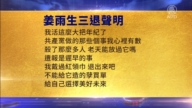【新唐人2012年10月20日訊】根據中共當局的數據顯示,2011年11月底,「扶貧工作會議」確定以農民「人均年純收入2300元」作為全中國新的「扶貧標準」,也就是「人均日純收入6.3元」。而中國還有1億2千8百萬人生活在貧困線下,到底這6.3元如何過一天?對比中共官員每年的公款吃喝開銷高達3000億,有網友留言(@Habiba77):「6.3元純過一天基本不太可能,水電油汽都是錢。不過飢餓一天倒是可以參與的。」接下來,就來聽聽中國底層人民體驗貧困生活的真實情況:
數據顯示,中國還有1億2千8百萬的貧困人口,佔大陸總人口數近十分之一。而中國新的扶貧標準,去年年末當局以農民「人均年純收入2300元」作為標準,按照一年365天計算,中國有近1億3百萬人每天人均純收入約6.3元。
中國的「扶貧基金會」為了響應「聯合國世界糧食計劃署」的號召,在「國際消除貧困日」當天呼籲民眾參與一天僅花費「六元三角」的貧困生活體驗。
上海商人謝丹表示,「6塊3毛」坐三次公車就沒了,更不用談吃飯穿衣的生活基本開銷,尤其是對那些在城市打工的農民工來講更是不可能。
上海商人謝丹:「其實到城裡來打工,這個待遇也相當的低,生活水平與原本城市裡面的居民根本不能相比,因為待遇不一樣,真正在農村務農的根本就沒有基本勞動收入,絕大部份只是圖個溫飽、然後子女的教育、生老病死的社會保障,根本就談不上。」
寧夏銀川張永寧:「現在菜價上漲,糧食也上漲,6塊3毛錢根本不夠,別的甚麼都不算,像冬天買煤、繳電費甚麼都不算,這一個月很節儉我還得花5百塊錢,咱們說你上街吃碗麵,吃碗麵還得10塊錢,除此之外,就是別的都不要幹,你說出去玩,上哪走走,開門就是錢,你就最好別出去。」
根據中共當局發佈的2011年《中國薪酬發展報告》數據顯示,中共高官年薪相當於農民工平均工資的4000多倍,明顯對比出貧富差距的懸殊。
江西網友劉女士表示,貧富差距造成的社會不公,6塊錢根本無法圖溫飽,而造成收入差距的原因,主要有國企資源的壟斷和貪官腐敗的亂象,跟那些貪官腐敗的金額比起來,訪民生活簡直是人間煉獄。
江西網友劉女士:「因為人大代表本身就是代表利益集團,這就是國家直接導致貧富(差距)是有很大原因的,我們沒有人權、沒有自由、沒有法治,法治已經死亡了,只有人治和權治,因為是特色國家,肯定是不奇怪,一天6塊多錢是不奇怪的。」
北京訪民賈女士:「6塊3毛錢對訪民來講,一天生活都不夠,在訪民身上一天最低也要10塊錢。」
另外,與「6.3元過一天」相對應的,是大陸餐桌上的驚人浪費。「中國農業大學食品科學與營養工程學院」調查的數據,大陸一年僅餐飲浪費的蛋白質和脂肪,就高達800萬噸和300萬噸,相當於倒掉了兩億人一年的口糧。
據了解,中共官員一年公款吃喝的開銷高達3000億,從各大酒店的餿水桶裏的「豐盛」菜餚,以及中國「地溝油」的猖獗,就可以知道浪費的程度有多可怕,這區區的6.3元對這些闊綽的官員們來講,連小費都不夠。
採訪/朱智善 編輯/黃億美 後製/郭敬
Three Hundred Billion RMB for Corrupt Officials’ Food Expenses and 6.3 RMB Per Day for the Poor
The Chinese authorities’ data shows that during the so-called
anti-poverty work meeting at the end of November 2011,
it was determined that a farmer’s per capita net income
of 2,300 yuan annually became a new poverty line.
That is 6.3 yuan ($1 USD) per day per capita net income.
China has 128 million people living under the poverty line.
How do they spend 6.3 yuan a day?
Some netizens said, “It is impossible to live with 6.3 yuan
a day since water, electricity, and gas all take money too.
However, one can go hungry for one day.”
Let’s hear how the lower social level of Chinese talks
about their real hardship in life.
The data shows that 128 million Chinese, which accounts
for nearly one-tenth of the total population of Mainland,
fall into the poor population.
The new poverty standards follow the farmers’ per capita net
income of 2,300 yuan as a standard since the end of last year.
When divided by 365 days a year, it can be seen that nearly
103 million people in China have only 6.3 yuan to spend every day.
In response to the call from the United Nations World Food
Programme (WFP), the International Day for the Eradication of Poverty,
sponsored by the China Foundation for Poverty Alleviation,
called on people to participate in a poverty experience by spending only $6.30 yuan for a day.
Shanghai businessman Xie Dan commented that without
factoring in living expenses, three bus rides cost 6.3 yuan,
and it would be impossible to live off that amount,
particularly for peasants coming to work as laborers in the city.
Shanghai businessman Xie Dan: “In fact, this is quite low,
even for those coming to work in the city.
You cannot compare their living standard with that
of the original residents of the city.
People who are from the rural area have no basic labor income.
Most of them just want to have three meals a day.
They cannot afford to think about the education of their children
and the social security for birth, age, illnesses and death.”
Zhang Yongling from Ningxia, Yinchuan, “The price
of everything is rising. 6.3 yuan is far from enough.
Not including utilities, 500 yuan a month
will barely cut it even with thrifty spending.
Just a bowl of noodles costs 10 yuan.
Besides, one cannot go anywhere.
If you go anywhere, you need to spend money.
You are better off staying home.”
According to the 2011 salary Development Report
published by the authorities,
a CCP senior official’s annual salary is equivalent to
4,000 times the average wage of peasant workers.
There is a sharp contrast between the rich and the poor.
Jiangxi netizen Ms Liu said that the gap between the rich
and the poor has created social injustice.
Six yuan is not enough to feed oneself.
The income gap results mainly from the monopoly
of state-owned resources and corruption.
Compared with the lives of corrupt officials,
petitioners’ lives are simply hell on earth.
Jiangxi netizen Ms. Liu: “The deputies of the People’s
Congress represent the interest group,
which is the primary cause of the gap between
the rich and poor. We have no human rights, no freedom.
The rule of law has died, only the rule of man and
the right to rule exist.
Because this is a special country, it is certainly not
surprising that six yuan for one day is not strange."
Ms. Jia, petitioner in Beijing: “6.3 yuan is not even enough
for a petitioner to live for one day. It is at least 10 yuan for a petitioner.”
In contrast to 6.3 yuan per day, Food Science and Nutritional
Engineering of China Agricultural University survey data shows shocking waste on dining tables.
It is learned that in Mainland the protein and fat waste reaches
as much as 8 million tons and 3 million tons a year, enough food to feed two hundred million people for one year.
It is understood that the CCP officials spend public funds
of up to 300 billion yuan on food and drink.
From the rich dishes in trash cans of the major hotels
and the prevalence of ditch oil, the extent of the terrible waste can be easily imagined.
A measly 6.3 yuan is nothing for these officials,
not even enough for a tip.






























